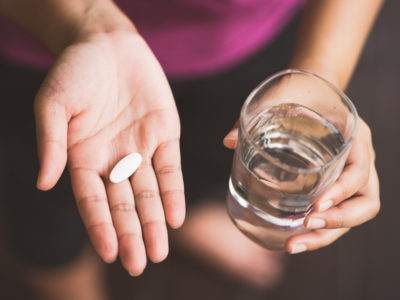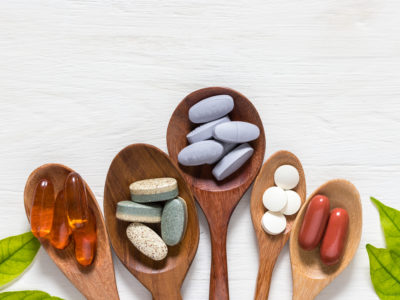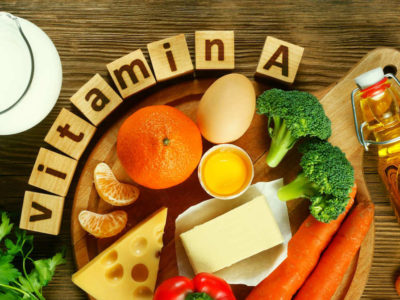Table of Contents[Hide][Show]
What is Vitamin B12?
Known as cobalamin, vitamin B12 is a water-soluble vitamin with the trace mineral cobalt as its central ion in its amine-containing molecular structure. Amines are similar to amino acids—the nitrogen-containing building blocks of proteins.
Vitamin B12 functions in your body as a coenzyme, meaning that it must be present for certain enzyme-catalyzed reactions to take place. It is especially important for your detoxification pathways (methylation), your nervous system, particularly the myelin sheath around the nerves, and for the formation of red blood cells and nucleic acids (which make up your genes).
Vitamin B12 is formed by microorganisms in a healthy gut. Unfortunately, most people’s gut bacteria (their gut microbiome) has been compromised by antibiotics, various toxins, and a less than stellar diet. Processed foods, dairy products, grains, and sugars are some of the worst offenders of the gut. Even sugar alcohols, like erythritol, mannitol, xylitol, maltitol, sorbitol, and lactitol, damage the gut and promote the growth of undesirable bacteria.
Due to compromised gut microbiome functionality, most people need to get B12 from their diet and/or supplements.
Who is Most at Risk for B-12 Deficiency?
Vegans are most at risk for B12 deficiency due to no intake of animal-based foods. Not every vegan is vitamin B12 compromised, but should consider taking a B12 supplement, or at least get tested for B12 status. Vegetarians, even though they include eggs and dairy products, are also at somewhat high risk for B12 deficiency.
Shockingly, a large percentage of avid meat eaters are also B12 deficient, due to their inability to absorb and utilize B12.
The elderly have B12 deficiency rates up to 86.5% due to digestive inefficiencies. However, all age ranges have significant percentages of people suffering with B12 deficiencies, from pregnant women and infants, through adolescents, to adults.
Related
9 Best Vegan Probiotics For Gut Health
If you do not consume dairy, here are some vegan probiotic foods that are are fantastic when it comes to taking care of your gut health.
Common Deficiency Symptoms of Vitamin B12
- Fatigue
- Memory loss
- Numbness or tingling in extremities
- Weakness
- Depression
- Breathlessness
- Headaches
- Pale skin
- Dizziness
- Smooth, red tongue and loss of taste sensation
- Anxiety
- Vision changes
Testing for Vitamin B12 Status
Unfortunately, a simple blood test for total cobalamin (B12) as a status marker may not give accurate results, and therefore be misleading. Alternatively or in addition, serum concentrations of homocysteine (tHcy) and methylmalonic acid (MMA) may give a more accurate picture. The best test may be one that measures functional deficiencies at the cellular level, such as the test offered by SpectraCell Laboratories.
Another reason to be tested is that elevated levels of serum cobalamin (not due to supplementation) may indicate the presence of a serious disease, such as cancer or liver disease.
Food Sources of Vitamin B12
Animal-based foods are the primary food source of vitamin B12. The best sources, in descending amounts, are shellfish, beef liver, fish, crustaceans, red meat, dairy products, and eggs. Of course you will want to choose safe sources of these foods, such as grass-fed animals and clean water environments for aquatic species. For example, be wary of farm-raised fish.
Some foods are fortified with vitamin B12, such as some nutritional yeasts, soy milk, and grain products. Spirulina was once thought to be a good source of B12, but it contains predominantly the pseudovitamin B12 molecular form which is not useable by the human body.
The Many Types of Vitamin B12
Most B12 supplements are in the form of tablets or capsules to be swallowed. However, some vitamin B12 supplement products are available for mucosal application, such as under the tongue or a gel applied to the nasal mucosa. If oral/mucosal consumption proves inadequate, vitamin B12 intramuscular injections may be the best alternative for people who have a difficult time absorbing and utilizing oral/mucosal B12 supplements.
Vitamin B12 can shape-shift between molecular forms with the appropriate enzyme action in the body…
- Cyanocobalamin – a chemically synthesized form of B12. Yes, it contains cyanide, but only a tiny amount, less than what is normally in your food, yet must be detoxified by the liver. This is the form you will see in most cheap B12 supplements.
- Methylcobalamin – an active form of B12 which can participate in enzymatic reactions
- Adenosylcobalamin – also an active form which can participate in enzymatic reactions
- Hydroxocobalamin – a form easily converted to the active forms above
- Dibencozide – is also known as cobalamide, which is an active co-enzyme form of vitamin B12. This form is purportedly better utilized by the mitochondria, our cellular powerhouses, than other forms.
Bottom Line: You might want to supplement a combination of the active forms.
Vitamin B12 Supplementation Amounts
The USDA Recommended Dietary Allowance (RDA) for adults is 2.4 mcg/day of vitamin B12, with fortified foods or supplementation recommended for people over age 50.
If you are tested and found to be deficient, listen to your doctor’s advice. That said, some doctors start their patients with oral supplementation of 1 mg of B12 daily for a month, and then back down to a maintenance dose of 125 to 250 mcg daily. B12 is a water-soluble vitamin, therefore excesses will be cast off in urine and not lead to toxicity.
Take good care and be well!
You May Also Like…





